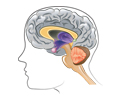- Sirisena D. My hands shake Classification and treatment of tremor. Australian Family Physician 2009;38 (9): 678-683
- Tremor Fact Sheet - (http://www.ninds.nih.gov/disorders/tremor/detail_tremor.htm)
About
Hand tremors are unintentional rhythmic movements of the hand that occur either at rest or with motion.
Tremors are unintentional, rhythmic movements of a part of the body that occur in a back-and-forth pattern. They are the most common of all involuntary movements and can affect the hands, arms, head, face, voice, trunk and legs. Tremors may occur at any age but are most common in middle-aged and older persons.
Several neurological disorders like multiple sclerosis, stroke, brain injury or neurodegenerative diseases that damage brain and nerve cells cause hand tremors. Other medical conditions like alcohol withdrawal, thyroid disorders, liver failure and lithium poisoning are also associated with tremors. Fatigue, anxiety, stress, aging, low blood sugar, some prescription medicines like amphetamine, corticosteroids and over use of caffeinated drinks can also cause hand tremors.
Tremors are generally caused by improper functioning of the part of brain that controls muscle movement throughout the body or in particular areas such as hands.
Hand tremors may occur:
- At rest
- During action
Depending on the tremor characteristics and the associated symptoms, the underlying cause of the tremor can be diagnosed. For example:
- Tremors at rest associated with rigid muscles and slow movements could suggest Parkinsonism.
- Tremors associated with a high pulse rate and weight loss may be due to high thyroid hormone levels.
- Tremors that appear within a reasonable time frame following drug ingestion may be induced by medications.
- Tremors that appear at the end of purposeful movements may be due to a problem in the cerebellum.
- Tremors in a diabetes patient may be due to excessive medication resulting in low blood sugar levels.








